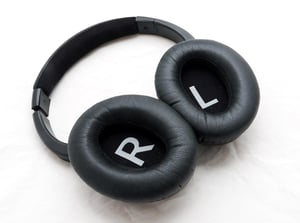Time to read: 7 minutes
 Ah, the sounds of silence.
Ah, the sounds of silence.
When you are concentrating on a task or engrossed in a favourite book, the latest thing you want is to be disturbed.
The brain is very good at tuning out sounds it doesn’t need to pay attention to - the hum of the fridge, the sound of construction next door - that’s known as selective hearing.
But sometimes you might need more support to get that peace and quiet you’re looking for which is why the use of noise cancelling headphone has become increasingly popular.
Active Noise Cancellation uses microphones to pick up low-frequency noise. Then the headset generates a sound that's phase-inverted by 180 degrees to the unwanted noise. That results in the two sounds cancelling each other out.
The idea dates back to the 1930s but it would take another 50 years for the theoretical possibility to become a technological reality in the late 1980s when airline pilots trialled noise cancelling headphones on long haul flights to reduce fatigue.
And with computing becoming more powerful, smaller and cheaper, noise cancelling headphones are now very affordable to the general public.
If you’ve been following our blog for a while, you will know that noise stimulation can be exhausting.
The reason is your brain uses its own computing power to process all the sounds your ears pick up and then interprets what those sounds mean - words in a conversation, the siren of a passing ambulance, the general noise and clatter of a busy coffee shop.
Not only is your brain performing numerous calculations in a fraction of a second to interpret the sound, it is also making lightning fast assessments about which of those ‘noises’ to pay attention to.
 If you have hearing loss you are hearing those sounds with less distinction and clarity - if at all!
If you have hearing loss you are hearing those sounds with less distinction and clarity - if at all!
That might sound like a relief, but the reality is, we need exposure to sound to keep those processing parts of our brain working optimally. If they are not stimulated, activity in that area eventually shuts down.
Hearing loss is not just an inconvenience, it is also associated with depression, social isolation and dementia, so it is important to maintain your best possible hearing with hearing aids.
And there’s the rub.
Once you’ve been fitted with hearing aids, and your brain is being exposed to sounds that it has to work to process, you might find yourself feeling exhausted at the end of the day. Sometimes clients come back to us to say, “I love my hearing aids, and I can hear sounds I’ve not heard in years, but is there away to cancel the noise?”
The answer is, ‘sort of’.
The computing power in hearing aids is advancing all the time. And with each new generation of hearing aid, there is improved processing which does an increasingly better job of delivering the sounds you want to hear, like conversation, while dampening competing noises.
In addition to more advanced computer chip sets, hearing aids also have directional microphones. Given that you are most likely to be looking at the person you’re speaking to, today’s modern hearing aids prioritise the sound in front of you and suppress the input from the second microphone that picks up sound beside and behind you.
We’ve got a great article here on the 3 Must Have Features in Hearing Aids that goes into greater detail about how computer chips, microphones and programs work to optimise your hearing.
But in truth, your hearing aids are going to pick up the sounds around about you - yes that does include passing traffic, and the caw of that insistent crow - because that’s what they’re supposed to do.
If you’ve had poor hearing for a while, exposure to sound through a new set of hearing aids can be a surprising experience. Since your brain is trying to determine what these sounds are and what they mean, it draws them all to your attention in case they represent danger.
This is why it is important to persevere with your hearing aids and to train your brain to focus on the sounds you want to hear and to delegate the rest to the background where they belong.
 Your brain is the best noise cancelling device under many circumstances. We have some great articles here on how to train your brain while wearing hearing aids.
Your brain is the best noise cancelling device under many circumstances. We have some great articles here on how to train your brain while wearing hearing aids.
Read more:
But just like the rest of the hearing population, there will be times where silence is truly golden and a set of noise cancelling headphones would be beneficial. There are many excellent ones on the market.
One that Value Hearing recommends is Audeara, which can be programmed for your hearing loss while giving you the opportunity to stream your favourite music or TV show. And yes, it does come with noise cancellation technology, so you can get that all important peace and quiet.